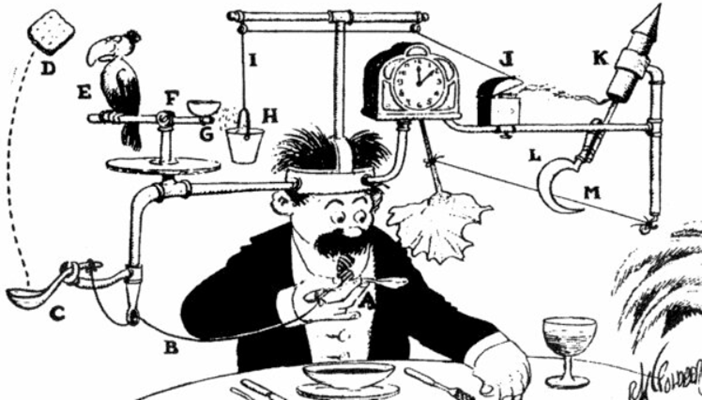George Carlin used to tell jokes about his time in Catholic school and his smart-ass interactions with The Church, like asking a priest if God is so powerful that he can create a rock so large that he himself can’t lift it. A similar situation has arisen closer to Earth. Vermont close.
In their pursuit of ineffable emissions goals, the Vermont Legislature has created an environmental standard so complex that no one knows how to implement it. Grokster Rob Roper explains.
The Clean Heat Standard (CHS), the “Rube Goldberg” carbon tax on home heating fuels, became law almost a year ago over the veto of Governor Scott. The Democrat/Progressive supermajority that passed the CHS did so without providing – or even considering in any significant detail – how it would work or what it would cost. Instead, they kicked that can into the laps of the Public Utilities Commission with the charge to just figure it all out – by September 2024 (fifteen months) for review before a legislative vote in January 2025.
So far, the only thing we’ve figured out is that this thing can’t be figured out. Certainly not by September 2024/January 2025 and probably not ever.
He proceeds to show us the receipts in support of the claim, which is simplified by the fact that the agencies tasked with achieving goals have not because the way the law is written, it can’t be done. This is progressive busybodying at its finest, and you’d be right to ask the next question.
How many emissions have been emitted not just during the drafting, deliberation, and passage of the Clean Heat Standard but also since trying to work out how it won’t work, starting with the fact that it creates a financial instrument (a carbon credit) the state would have to oversee and regulate (more government, more emissions).
“From the outset, you should treat the credit like a financial instrument if you want to see what happens when you don’t, look at the beginnings of the European Emissions Trading System ten or twelve years ago. It was a disaster. They are a financial instrument. They are basically the same as money, so you need to track them like that. There should be a single registry for credits, and they should all have unique identifiers…. And the final thing, I’d say, is there should be an annual review of market activity. It seems like overkill on day one, but it is really important to understand what is happening in the credit market to make sure that it’s being operated above board….”
Yeah, all that. And much more. Good luck hammering out the details of how to create, track, and regulate what is essentially a new crypto-currency during a three-hour Zoom meeting! This is not the fault of the TAG or the EAG, it’s the fault of the morons who passed this law with this time frame with this bureaucratic framework without doing anywhere near the due diligence necessary to determine if this were possible.
And Vermonters didn’t even want it. They don’t want to pay more to heat and cool their homes, but that’s what this does if they can figure out a way to make it work, which is not a bad thing. The longer it takes, the more time you have to replace them and get this repealed.
